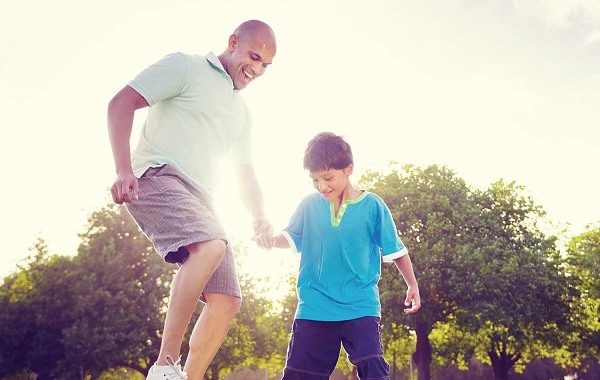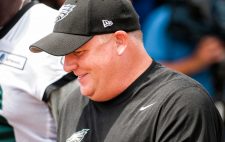Veteran coach James Galanis was shocked and dumbfounded and a little ticked off. Standing on the sidelines to watch a youth soccer game – players were 7- and 8-year-old girls – he heard a mother rip in to her little girl for a bad play. “There were F-bombs flying,” he says.
“She said, ‘Wait until I get her in the car,’ and she used all types of vulgar language,” says the veteran coach, who is best known for his training of World Cup soccer champion Carli Lloyd.
“The kids just want to play, but often parents ruin everything with high expectations, crappy behavior on the sideline, talking about other kids in front of their kids and talking about the coach,” he adds.
Galanis, who is director of soccer operations for Universal Soccer Academy in Medford, wishes more parents understood how much their behavior – both negative and postive – can affect their child. “The parent’s job is to applaud and encourage effort,” he says. “All you should be talking about when it comes to their sport is focus, effort and fun.”
 A vital part of making a child’s athletic experience positive lies with the adult leadership, including coaches, officials, other parents and even the league organizers, says Gregg Heinzmann, director of the Youth Sports Research Council at Rutgers University. “But the key part of that is the parent’s role,” he says. “They need to understand the purpose for enrolling their kids in the first place.”
A vital part of making a child’s athletic experience positive lies with the adult leadership, including coaches, officials, other parents and even the league organizers, says Gregg Heinzmann, director of the Youth Sports Research Council at Rutgers University. “But the key part of that is the parent’s role,” he says. “They need to understand the purpose for enrolling their kids in the first place.”
Problems with parents often start when they don’t set realistic expectations for their child athlete. “Don’t put him on a high team where he’ll sit the bench because he’s not good enough,” says Galanis. “That’s setting the wrong expectation.”
And even on the right team, he continues, not every child will have a good game. “Your child is learning. You can’t be negative and start pointing fingers. You’ve got to be there with them through good times and bad times.” So, when your child sits on the bench, that’s the time to encourage him to work harder. “Make it into a healthy situation your kid learns from.”
No matter your child’s age, stress from sports can be very difficult to manage, especially if the child plays a particular sport year-round and is especially good.
“Watching your daughter or son play organized sports in a public setting where the outcome really matters – the game is on the line – is an extremely stressful experience. The intensity ratchets up over time. Your child starts to wear their name on the back of the jersey or their town on the front of the jersey. It’s no longer just about them but about them representing themselves, their family and their community.”
Too much pressure and too much practice can lead to burn out, even for teens and pre-teens, and make them want to stop playing. “It’s no longer fun,” says Heinzmann. “It becomes a job and a means to an end, which is often a college scholarship.”
Galanis wishes parents better understood the important life lessons that come from sports. Winning, losing, dealing with strict coaches and being part of a team that operates together to create one goal – those are the life lessons sports teaches. “The way you deal with your coach – you’re basically practicing the way you’ll deal with your boss,” he says. “The way you deal with your teammate is the way you’ll deal with your workmate eventually.”
But choosing when your child should sign up for their first team and start learning those life lessons can be tough. Some peewee teams start kids as young as 3. That’s too young, says Jeffrey Daniels, MD, of Advocare South Jersey Orthopedics.
He believes 7 or 8 years old is appropriate for a contact sport, as long as coaches provide protective equipment and the kids are playing against others of their own size, weight and age.
“The dangers of starting too young are the joints are still developing and the ligaments and tendons are not as strong as they need to be,” says Daniels. As the kids get older, whether specializing in one sport year-round or playing multiple sports without getting proper rest, overuse injuries are a prevailing problem.
The best way to prevent these injuries is through proper conditioning. “You want to warm up the joints and muscles before you’re competing, stretching out muscles to avoid pulls and stretching out joints to avoid overuse injuries to the joints,” says Daniels. “You should also stretch after an activity and be on a strengthening program as you get older. Kids must also learn proper technique from the coaches and use proper equipment.
“Coaches need to pay attention to the physical needs of the sport and pay attention to each child’s health,” adds Daniels. “Hydration is important, rest is important, and if it’s too hot, you need to be in the shade.”
If your child does suffer an injury, follow your doctor’s instructions, including getting clearance to play.
“If your child goes back too soon,” Daniels says, “the injury could worsen, become a chronic injury or affect the growth plate.”
Galanis recalls coaching a teenage girl who suffered a concussion two weeks before Christmas. “The day after Christmas we have a tournament, and the father brings me a certificate that says she can play,” he recalls. “I’m skeptical but he insisted she was fine. I put her in, and 10 minutes into the game she came to the bench and said she felt sick, like she was going to throw up.”
Galanis pulled her from the game and wouldn’t allow her to play the rest of the weekend. “She wasn’t over the concussion,” he says. “Her father approached me and said he wanted her to continue to play in the tournament. I said absolutely not. I wasn’t being mean, I was saving his daughter. He was willing to put his daughter’s whole mental health on the line so he could see her play.”
A parent’s judgement can be clouded when it comes to their child and sports, and Heinzmann says that can stem from a parent trying to live vicariously through their child. “But this is their life – let them live it,” he says.
Parents also need to step back and let the coach do his job. “The coach should tell parents, ‘I’m going to discipline your child. I might have to raise my voice and call out his name because he’s either not doing something he should be or he’s doing something he’s not supposed to be and might end up hurting himself or someone else,’” Heinzman says.
Galanis warns against parents coaching from the sidelines. “There shouldn’t be yelling about anything that’s tactical, instructional or tells a kid to move to a certain place or do a certain thing with the ball,” he says. “Parents yelling instructions can hurt the coach’s plan and the team’s long-term plan.”
Galanis strongly believes that all parents should be mandated to take a course prior to their child joining an organized sports team. “The issue with youth sports is that there’s not enough parent education,” he says. “They should do at least an online course on the habits you need to have at home, on the sideline, when talking to your coach and with other parents.”
The Youth Sports Research Council offers the S.P.O.R.T. Program (Supportive Parents on the Right Track) to help parents understand their role in their children’s athletics. Effective communication, setting a good example, and supporting versus pushing your child are all covered.
“Education is essential,” Galanis adds, “to making youth sports a positive experience. You’ve got a cocktail for disaster brewing amongst almost every single team in youth sports across America.”












